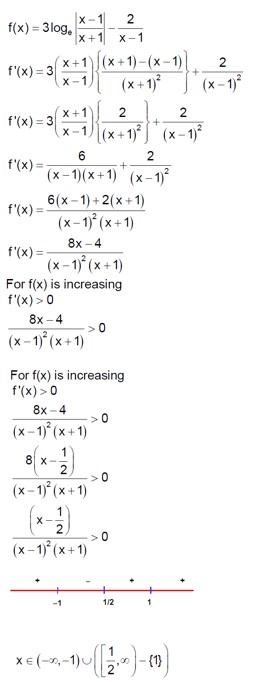If m and n respectively are the number of local maximum and local minimum points of the function f(x) then the ordered pair (m, n) is equal to....................
If m and n respectively are the number of local maximum and local minimum points of the function f(x) then the ordered pair (m, n) is equal to....................
Option 1 -
(3, 2)
Option 2 -
(2, 3)
Option 3 -
(2, 2)
Option 4 -
(3, 4)
-
1 Answer
-
Correct Option - 2
Detailed Solution:Now,
Changes sign from positive to negative at x = 1, 1 So, number of local maximum points = 2
Changes sign from negative to positive at
x = 2, 0, 2 So, number of local minimum points = 3
Similar Questions for you
f (x) is an even function
So, f (x) has at least four roots in (-2, 2)
So, g (x) has at least two roots in (-2, 2)
now number of roots of f (x)
It is same as number of roots of will have atleast 4 roots in (-2, 2)
Let
So, f(x) = x
Now,
f(x) = αx – b
option (D) satisfies
f (x) = f (6 – x) Þ f' (x) = -f' (6 – x) …. (1)
put x = 0, 2, 5
f' (0) = f' (6) = f' (2) = f' (4) = f' (5) = f' (1) = 0
and from equation (1) we get f' (3) = -f' (3)
So f' (x) = 0 has minimum 7 roots in
h (x) = f' (x) . f' (x)
h' (x) = (f' (x)2 + f' (x) f' (x)
h (x) = 0 has 13 roots in x
h' (x) = 0 has 12 roots in x
1 + x? - x? = a? (1+x)? + a? (1+x) + a? (1+x)² . + a? (1+x)?
Differentiate
4x³ - 5x? = a? + 2a? (1+x) + 3a? (1+x)².
12x² - 20x³ = 2a? + 6a? (1+x).
Put x = -1
12 + 20 = 2a? ⇒ a? = 16
Taking an Exam? Selecting a College?
Get authentic answers from experts, students and alumni that you won't find anywhere else
Sign Up on ShikshaOn Shiksha, get access to
- 66k Colleges
- 1.2k Exams
- 681k Reviews
- 1800k Answers

